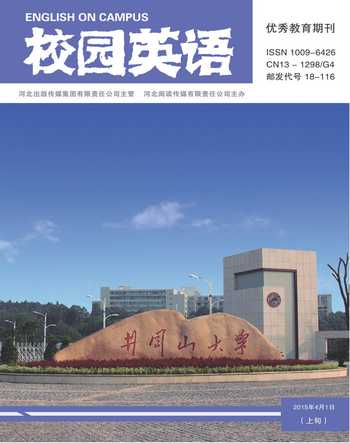A Cross—cultural Comparative Study on the English Euphemism and Chinese Euphemism
叶益好 单俊 杨黎璟
【Abstract】In this essay,on the basis of cultural research,the author illustrates a number of examples to explore the cultural difference between Chinese and English euphemism.Through the cross cultural comparative study of English and Chinese euphemisms,we can learn about lots of both similarities and peculiarities of the two languages,which is of considerable value and guidance to our foreign language learning and cross-cultural communication.
【Key words】euphemisms; cross-cultural comparison; taboo
1.Introduction
Euphemism is a common linguistic phenomenon in different cultures,it plays the role of“lubricant”in peoples daily communication.To some extent,the euphemism generates from such circumstances of avoiding shame,of avoiding privacy and other psychological problems during interpersonal communication.
2.Cross-cultural comparison between Chinese and English euphemisms
2.1 Similarities between Chinese and English euphemisms
2.1.1 Avoiding taboo.Every country with different cultures has its own taboo.With regard to death,it is surely that only few people are not scare death.All these scares and unpleasant feelings have lead people to avoid talking about death.In English countries,people prefer to connect it with its affective meaning to replace death,for example,‘join the angels,‘pass away,‘and join the great majority,etc.
2.1.2 Showing politeness.Politeness is a symbol of humans civilization and an important principle in peoples communication.For instance,‘Old is represented by ‘senior citizens or ‘superior citizens to refer to the old people in English-speaking country.Besides,the word “poor” also has many euphemisms.
What the writer has set above are examples of English euphemism.Following is a good example of Chinese euphemism:
(孟祥英的婆婆)年轻时候外边朋友们多一点,老汉虽然不赞成,可是也惹不起她----说也说不过她,骂更骂不过她。(赵树理《孟祥英翻身》)
The euphemism “外面朋友多一点”(have many friends outside) implies Meng having romantic relationship with others.Here euphemism is used to avoid causing embarrassment.
Seen through the instances here,euphemism does express politeness to others.
2.2 Differences between Chinese and English euphemisms
2.2.1 Different Connotations of Old.Some words with neutral or positive connotations in Chinese have negative or unpleasant connotations in English and thus need euphemizing.
To be old means to be more experienced and knowledgeable.As a matter of fact,the term “老” (old) is quite often used to indicate seniority and experience,so we Chinese have such expressions as “老师傅”,“老板”,“老总”,etc.These terms have no specific connotations of age,and they just show the speaker's respect for the hearer.
Old age is valued in China but tabooed in the western nations.It is said that the Americans are afraid of being old.Americans want to act,feel and look young.By employing euphemism,“old” is tactfully avoided in language .Thus,the elderly are “seasoned”,“well preserved”,etc.The aged become “senior citizens”,who are enjoying their “golden years”.
2.2.2 Different Connotations of Death.Chinese euphemisms on death in the feudal society are different according to the social class,position and social estate.The Book of Rites·ceremony music said “ the death of emperor called ‘崩,the death of duke called ‘薨,the death of officials called ‘卒,the death of soldiers called ‘不禄,and the death of common people called ‘死”.
In English,the“death”of the many euphemisms are from the Bible and Christianity,such as“be safe in the arms of Jesus”,“be asleep in the valley”.While in Chinese the“death”are mainly from Taoism and Buddhism,such as ‘羽化、登仙、归西 in Taoism and ‘坐化、升天、灭安in Buddhism.
3.Conclusion
Euphemism is a common linguistic phenomenon both in English and Chinese.It is the use of a pleasant,polite,or harmless-sounding term in place of those considered unpleasant,rude or offensive.By contrastively studying the English and Chinese euphemisms we may get to know different values,different historical backgrounds as well as the different cultures,which is invaluable for our foreign language learning and teaching,intercultural communication and so on.It is worth all the efforts to explore.
Reference:
[1]Bolinger Dwight, Aspects of Language, New York: Harcourt BraceJovanavich, 1981.
[2]Deng Yanchang & Liu Runqing.Language and Culture.Beijing: Foreign language Teaching and Research Press, 1989.
[3]Encyclopedia Britannica,Encyclopedia Britannica, Incorporated,2003-03.
[4]Hu Wenzhong and Grove C.L, Encountering the Chinese, Maine: Intercultural Press Inc.1991.
- 校园英语·上旬的其它文章
- Green Design—the Development direction of Industrial design
- 安吉拉·卡特《明智的孩子》私生主题的女性主义研究
- 葛浩文英译《红高粱家族》之适应与选择
- Research on the Application of Chinese Traditional Culture Art Elements in Modern Graphic Design
- Analysis of Gender Differences in Color Reaction in TV Show You Are the One
- Multiple Roles of Secretaries

